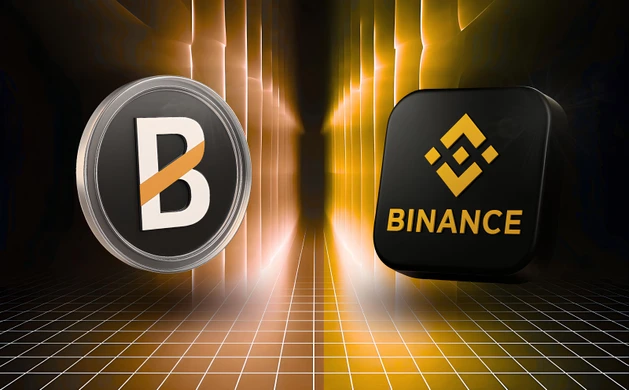Bitpanda Supported and Restricted Countries

Summary: Bitpanda restricts onboarding outside its 48 supported verification markets and excludes US persons, citing regulatory requirements; transfers are subject to the Travel Rule since late 2024.
Support is concentrated across Europe and adjacent territories with EU-friendly rails (SEPA, bank transfers), cards where available, and ten fiat currencies governed by method-specific limits.
Bitpanda, a regulated platform with over 7 million users, supports 48 countries in Europe and regions like the UAE while restricting access for US citizens and sanctioned areas.
Licenses and Regulation
EMI, BaFin, ESMA, CySEC
Country Availability
Europe, the UK, UAE & 40+ more
Available Assets
Crypto, Stocks, Metals, ETFs
Bitpanda Restricted Countries
Bitpanda currently restricts access to approximately 150 countries and territories, according to its official verification eligibility list (Bitpanda Helpdesk, accessed October 2025).
The following regional overview highlights where registration is not available:
- United States and territories: Prohibited due to strict regulatory barriers; Bitpanda explicitly excludes US citizens and anyone located within US jurisdiction.
- Latin America and the Caribbean: Most countries, including Argentina, Brazil, and Mexico, remain outside the verification scope due to licensing and partner limitations.
- Africa: The entire continent is effectively restricted, reflecting an absence of operational or regulatory coverage under Bitpanda’s European compliance model.
- Asia-Pacific: Broadly unavailable, including India, China, Japan, and Australia, where Bitpanda lacks local authorisation or verification partner access.
- Middle East (non-UAE): Only the United Arab Emirates is available; other regional markets remain restricted for onboarding or fiat gateway use.
- North America (non-US): Canada and Caribbean islands are not onboardable at this time, as the platform’s focus remains EU-centric.
- Eastern Europe and CIS (partial): Non-EU states such as Russia, Ukraine, and Belarus are excluded due to regulatory and sanctions-related constraints.
- Other global regions: Offshore territories and unlisted jurisdictions are treated as restricted until formal verification partnerships or licences are announced.
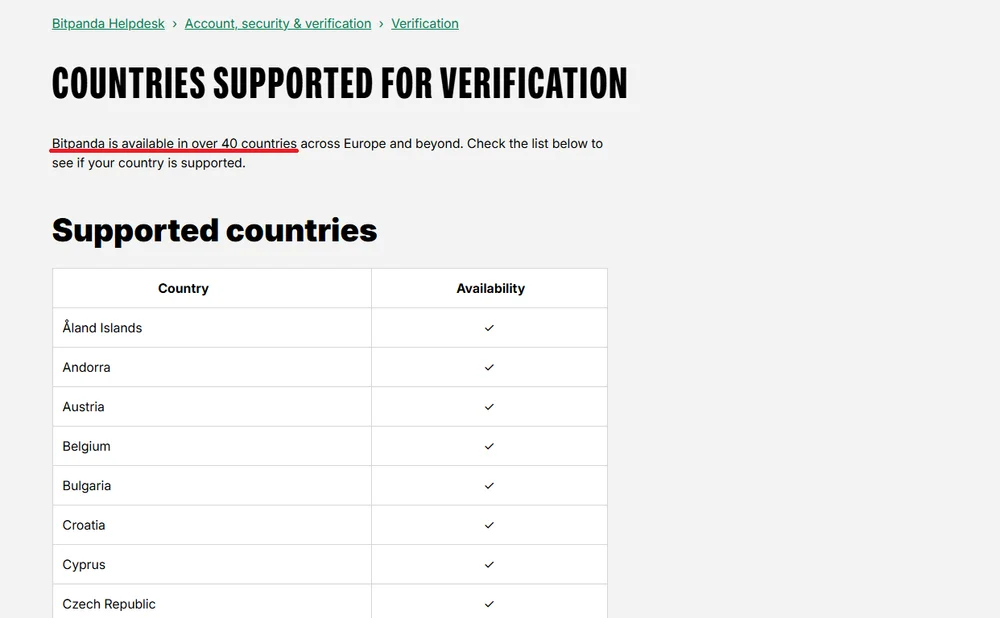
Bitpanda Supported Countries
Bitpanda operates across 48 European and nearby jurisdictions, forming a focused network of compliant markets within EU and EEA frameworks. Key territories include Germany, France, Italy, Spain, the United Kingdom, Switzerland, and the Nordic region, all under harmonised European financial regulations.
Users across these jurisdictions access 10 fiat currencies with localised deposit and withdrawal options, such as SEPA transfers, cards, and alternative payment rails. Daily and monthly transaction limits vary by method, while corporate and high-volume traders can increase thresholds.
According to Similarweb, Bitpanda records around 18 million monthly visits, dominated by Hungary (32.83%), Germany (16.10%), France (9.43%), Italy (7.90%), and Austria (7.54%). The remaining 26.19% originates from smaller European markets, underscoring the platform’s distinctly continental user base.
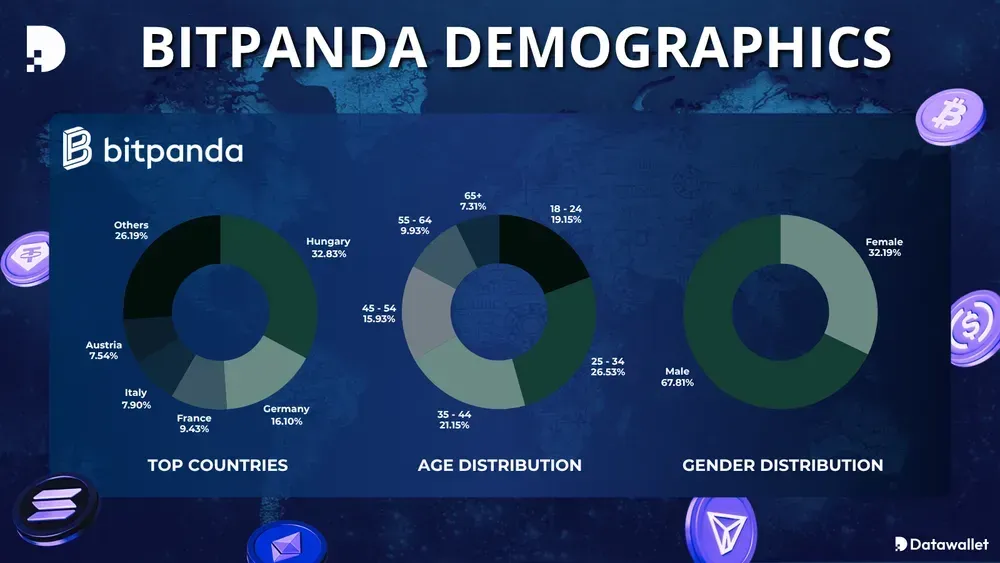
Bitpanda Licenses and Regulation
Bitpanda highlights a highly regulated position with 16 European licences & registrations, plus MiCAR authorisations (Germany, Austria, Malta), FCA registration (UK), and a VARA VASP licence step in Dubai (per Bitpanda public policy/security pages, 2025).
Below is a concise, source-aligned overview:
- MiCAR (Germany): The first major EU crypto licence granted under the MiCAR framework, allowing Bitpanda to provide regulated crypto brokerage and custody services domestically.
- MiCAR (Austria): Extends Bitpanda’s home-market compliance through full MiCAR authorisation, reinforcing oversight under Austrian financial law and European harmonised standards.
- MiCAR (Malta): Establishes cross-border passportability within the EU, supporting unified regulatory coverage and transparent operations across Europe’s smaller digital-asset markets.
- United Kingdom (FCA registration): Officially registered as a cryptoasset firm since February 2025, enabling compliant service to UK residents via Bitpanda Broker UK Ltd.
- Dubai (VARA, VASP licence): Granted in-principle approval in March 2025, marking Bitpanda’s first regulated entry into the Middle East under VARA’s international standards.
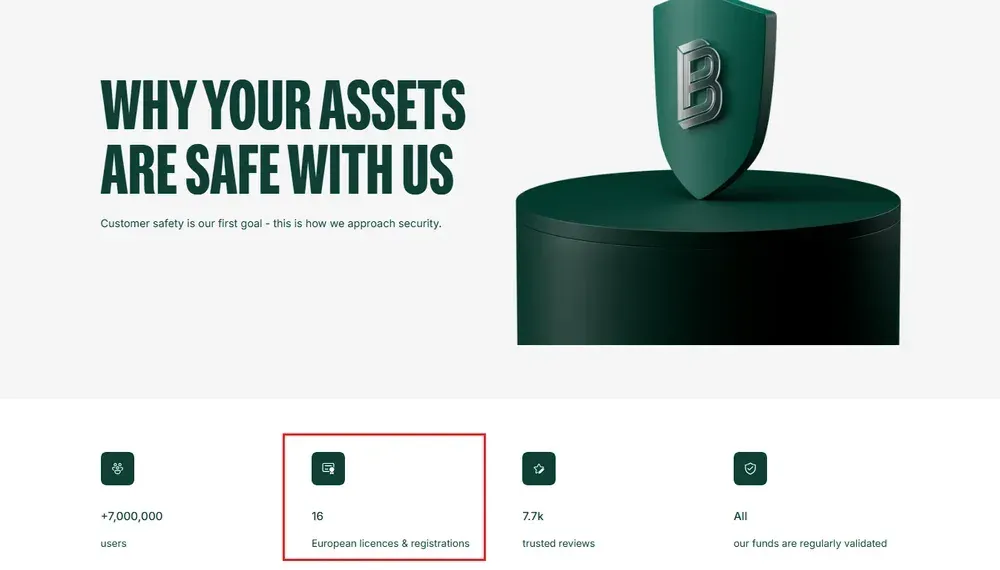
Bitpanda KYC Requirements
Know Your Customer (KYC) verification on Bitpanda requires users to be at least 18 years old, provide a valid ID through approved partners, and reside in a supported country. The process is conducted entirely online via regulated identification providers, ensuring full compliance with European KYC and AML standards.
Once verified, users can access over 2,000 digital and traditional assets, including crypto, stocks, ETFs, commodities, and metals. Verification cannot be completed manually or by post, and IDs from non-supported countries do not grant onboarding access.
Limits differ by payment method and cover daily, monthly, and lifetime thresholds, with higher caps through Business accounts or OTC deals above €1 million. Since December 2024, Bitpanda has applied the EU Travel Rule, requiring sender and recipient data for crypto transfers and occasionally causing minor delays.
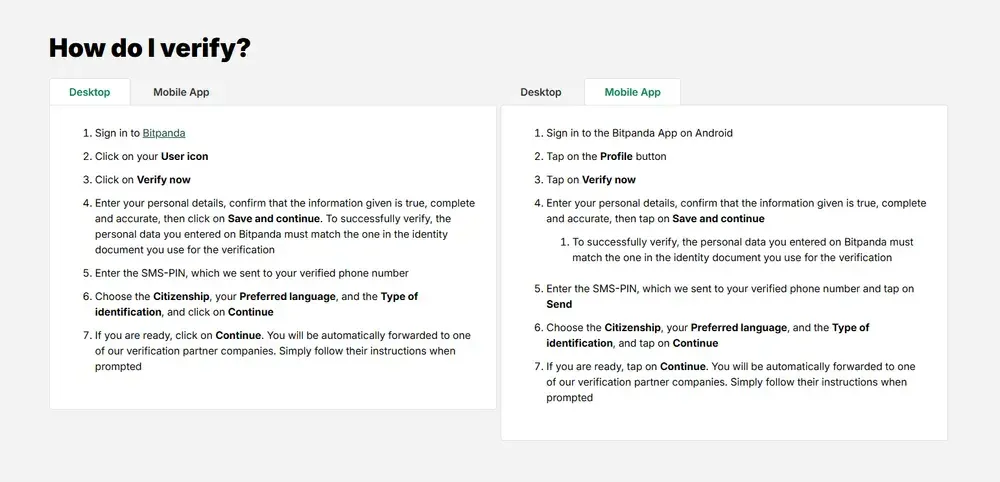
Can I Use Bitpanda in the USA?
No. Bitpanda states that US citizens and persons located in the United States may not become users for regulatory reasons. This ineligibility applies regardless of whether your identity document is otherwise acceptable to verification providers.
If you reside in a non-supported country, verification isn’t possible and there are no manual/alternative verification routes (no postal, email, or in-person verification). Attempting to bypass these restrictions may violate Bitpanda’s terms and could lead to account closure.
For readers based in the United States, see our independently researched guide on the Best Crypto Exchanges in the USA for compliant, SEC and FinCEN-regulated alternatives.
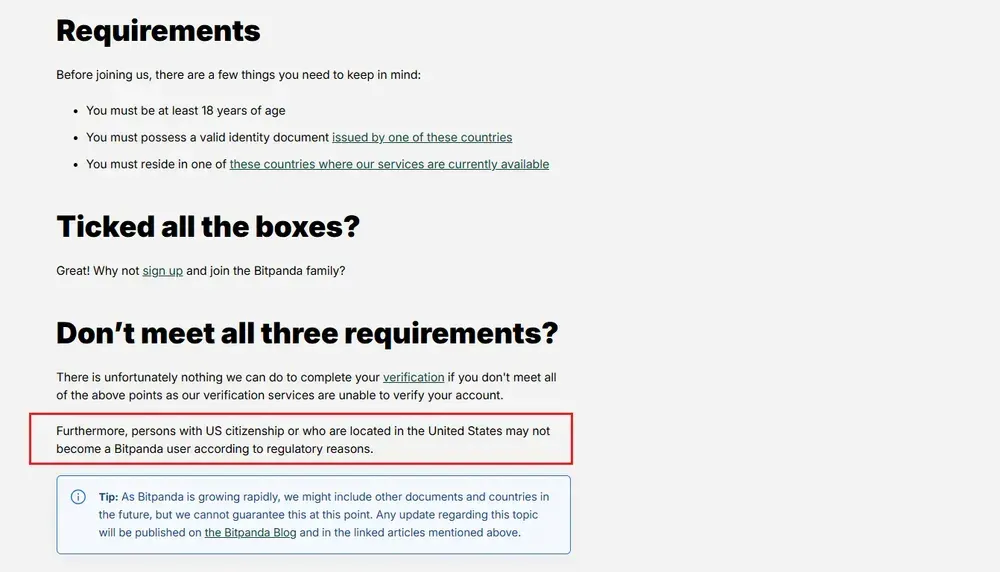
About Bitpanda
Bitpanda is a European crypto and investment platform, founded in Vienna in 2014, providing compliant access to digital assets, stocks, ETFs, metals, and yield products with an EU-first approach. The company emphasises licensure, transparency, cold-storage custody, ISO 27001 and SOC 2 certifications.
Beyond core crypto services, Bitpanda offers Cash Plus (EUR/GBP/USD money-market-linked yields), staking, indices, savings plans, and OTC trading for large orders. Its policy stance promotes smart regulation, highlighted by multiple MiCAR licences, FCA registration, and an early VARA foothold in Dubai.

Final Thoughts
If you live in a supported country, Bitpanda offers EU-level compliance, broad asset coverage, and straightforward fiat funding options. Those outside the supported regions, including the United States, cannot register, and tools such as VPNs or foreign IDs will not bypass residency restrictions.
Always check the latest availability, limits, and Travel Rule requirements directly in your account before transferring funds, as these factors can affect transaction eligibility and processing times.
Frequently asked questions
Is Bitpanda available in the UK?
Yes. UK residents can register via Bitpanda Broker UK Ltd, and Bitpanda has FCA registration as a cryptoasset firm (2025).
Can residents of Australia use Bitpanda?
No. Australia is not on the 48 supported verification markets; residency outside the supported list prevents onboarding.
Can I use a VPN to access Bitpanda from a restricted country?
Using a VPN doesn’t change residency eligibility and may violate terms; accounts can be restricted or closed if misuse is detected.
Which fiat currencies and limits does Bitpanda support?
Bitpanda supports ten fiat currencies with method-specific daily, monthly, and lifetime limits; availability, fees, and limits vary by currency and provider.

Written by
Jed Barker
Editor-in-Chief
Jed, a digital asset analyst since 2015, founded Datawallet to simplify crypto and decentralized finance. His background includes research roles in leading publications and a venture firm, reflecting his commitment to making complex financial concepts accessible.





